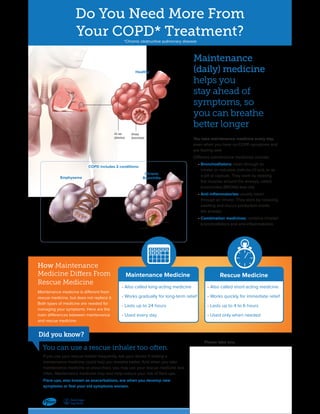More Related Content
Similar to COPD Multicultural Poster and Tear Pad
Similar to COPD Multicultural Poster and Tear Pad (20)
COPD Multicultural Poster and Tear Pad
- 1. Maintenance
(daily) medicine
helps you
stay ahead of
symptoms, so
you can breathe
better longer
You take maintenance medicine every day,
even when you have no COPD symptoms and
are feeling well.
Different maintenance medicines include:
• Bronchodilators: taken through an
inhaler or nebulizer (neh-bu-LY-zur), or as
a pill or capsule. They work by relaxing
the muscles around the airways, called
bronchioles (BRONG-kee-ols)
• Anti-inflammatories: usually taken
through an inhaler. They work by reducing
swelling and mucus production inside
the airways
• Combination medicines: combine inhaled
bronchodilators and anti-inflammatories
If you use your rescue inhaler frequently, ask your doctor if adding a
maintenance medicine could help you breathe better. And when you take
maintenance medicine as prescribed, you may use your rescue medicine less
often. Maintenance medicine may also help reduce your risk of flare-ups.
Flare-ups, also known as exacerbations, are when you develop new
symptoms or feel your old symptoms worsen.
Did you know?
You can use a rescue inhaler too often.
Lung
How Maintenance
Medicine Differs From
Rescue Medicine
Maintenance medicine is different from
rescue medicine, but does not replace it.
Both types of medicine are needed for
managing your symptoms. Here are the
main differences between maintenance
and rescue medicine:
Do You Need More From
Your COPD* Treatment?
Rescue Medicine
• Also called short-acting medicine
• Works quickly for immediate relief
• Lasts up to 4 to 6 hours
• Used only when needed
Inflamed airway
(bronchiole)
Excess
mucus
Chronic
Bronchitis
*Chronic obstructive pulmonary disease
Healthy
Airway
(bronchiole)
Air sac
(alveolus)
Enlarged
air sac
(alveolus)
Emphysema
Collapsed
airway
(bronchiole)
Please take one.
Copyright © 2013, Boehringer Ingelheim Pharmaceuticals, Inc. All rights reserved.
COPD includes 2 conditions:
Maintenance Medicine
• Also called long-acting medicine
• Works gradually for long-term relief
• Lasts up to 24 hours
• Used every day
x x x x
x x x
x
- 2. Talking About Your Symptoms
Answer these questions before your
next appointment. Bring this with you
to share with your doctor.
1. My breathing problems are getting
BETTER or WORSE (Circle One)
Explain:____________________
__________________________
__________________________
2. I use my rescue inhaler____
times a week.
3. These are my symptoms and how
they’re doing:
- Persistent cough
(a cough lasting 8 weeks or
longer in adults)
BETTER or WORSE (Circle One)
- Coughing up phlegm or mucus
BETTER or WORSE (Circle One)
- Shortness of breath
BETTER or WORSE (Circle One)
- Wheezing or whistling when
I breathe
BETTER or WORSE (Circle One)
- Feeling tightness or pressure
when breathing
BETTER or WORSE (Circle One)
4. I currently take these medicines:
(List medicines for ALL your
medical conditions. Include over-
the-counter medicines, vitamins,
and herbal supplements)
__________________________
__________________________
__________________________
__________________________
5. I’ve had to cut back on some of my
usual activities, including:
__________________________
__________________________
__________________________
6. I exercise ___ times a week.
Questions to ask your doctor about
your overall health
• What else can I do to
manage COPD?
• What are safe ways for me
to be active?
• Where can I get help to
stop smoking?
• Do I need to lose weight?
• What vaccines should I have?
Is It Time to Start Taking
Maintenance (Daily)
Medicine for COPD*?
*Chronic obstructive
pulmonary disease
Questions to Ask Your Doctor
About Treating Your COPD
1. What can I do to keep my COPD
from getting worse?
2. What is maintenance medicine?
3. How is maintenance medicine
different from rescue medicine?
4. How and when do I take
maintenance medicine?
5. Do I need to make any changes
with the medicines I currently take?
6. What else can I do to reduce my
COPD symptoms?
7. What signs of a flare-up should I
watch out for?
8. Does maintenance medicine help
with flare-ups?
Remember to answer
the questions on the
reverse side before you
see your doctor.
Flare-ups, also known as
exacerbations, are when you
develop new symptoms or feel
your old symptoms worsen.
AHE 1733 Spiriva PstrTP
6” x 7”
Copyright © 2013, Boehringer Ingelheim Pharmaceuticals, Inc. All rights reserved.
